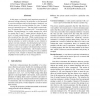Free Online Productivity Tools
i2Speak
i2Symbol
i2OCR
iTex2Img
iWeb2Print
iWeb2Shot
i2Type
iPdf2Split
iPdf2Merge
i2Bopomofo
i2Arabic
i2Style
i2Image
i2PDF
iLatex2Rtf
Sci2ools
CSFW
2006
IEEE
2006
IEEE
Coercion-Resistance and Receipt-Freeness in Electronic Voting
In this paper we formally study important properties of electronic voting protocols. In particular we are interested in coercion-resistance and receipt-freeness. Intuitively, an election protocol is coercion-resistant if a voter A cannot prove to a potential coercer C that she voted in a particular way. We assume that A cooperates with C in an interactive fashion. Receipt-freeness is a weaker property, for which we assume that A and C cannot interact during the protocol: to break receipt-freeness, A later provides evidence (the receipt) of how she voted. While receipt-freeness can be expressed using observational equivalence from the applied pi calculus, we need to introduce a new relation to capture coercion-resistance. Our formalization of coercionresistance and receipt-freeness are quite different. Nevertheless, we show in accordance with intuition that coercionresistance implies receipt-freeness, which implies privacy, the basic anonymity property of voting protocols, as defined ...
| Added | 10 Jun 2010 |
| Updated | 10 Jun 2010 |
| Type | Conference |
| Year | 2006 |
| Where | CSFW |
| Authors | Stéphanie Delaune, Steve Kremer, Mark Ryan |
Comments (0)

